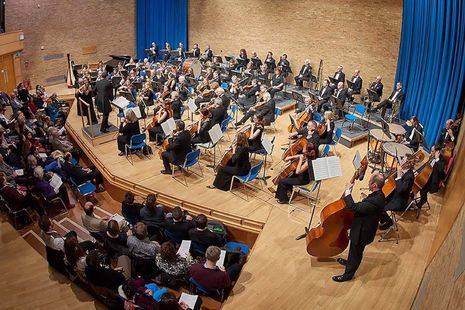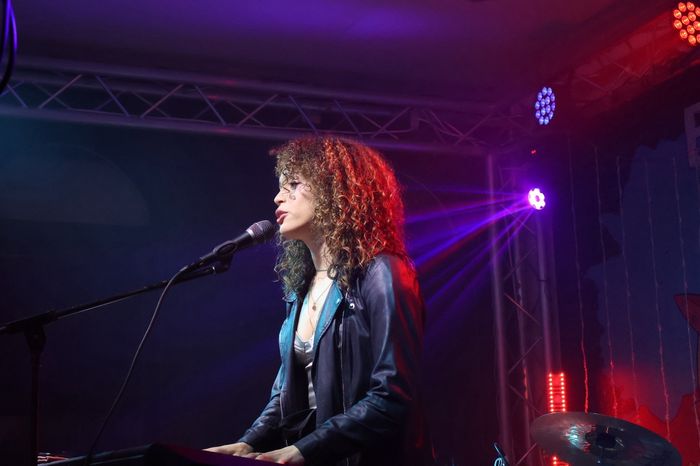Classical music getting off its high horse: CCSO at West Road Concert Hall
The amateur symphony orchestra delivered an impressive performance of canonical classics and contemporary compositions

Last Saturday (11/05), a healthy audience congregated in West Road Concert Hall for a concert by the City of Cambridge Symphony Orchestra (CCSO), an amateur ensemble led by professional conductor Robert Hodge. In many ways, the program reflected the current state of classical music, combining Shostakovich’s ‘Piano Concerto No. 2’ and Tchaikovsky’s ‘Symphony No. 4’. These canonical works by recognisable names bring in audiences, while the contemporary composer Anna Clyne’s ‘This Midnight Hour’ represents a push to diversify the genre’s often stiflingly narrow repertoire.
“I recognise the value of contemporary classical music getting off its modernist high horse”
Opening the programme, Clyne was a wise choice for introducing a local audience, certainly of conservative aesthetic tastes, to music beyond the classics. Premiered in 2015, it’s a clear example of the trend in recent composition away from the difficult and alienating modernist aesthetics that dominated the late 20th century towards more consonant and tonal styles. The piece was clearly inspired by modern orchestral film scores, feeling at various points suited for a love scene or a chase. It had a captivating start of stormy swells and shakes across the lower strings, brass and percussion that gradually tempered into more melodic writing. For the final section, Clyne established a short harmonic cycle that was reminiscent of Hans Zimmer or an orchestral pop arrangement. I missed the dissonant edge hinted at during the beginning of the piece but I recognise the value of contemporary classical music getting off its modernist high horse and utilising a style people can connect with. It even garnered the highest praise from one (female) patron I overheard in the interval: “as modern pieces by females go, it wasn’t bad.”
“I missed the dissonant edge hinted at during the beginning of the piece”
Next on the programme was Shostakovich’s ‘Piano Concerto No. 2’. Written as a 19th birthday present to his son Maxim, it’s a fairly innocent composition, especially when compared to most of the composer’s output. Pianist Simon Callaghan, dressed more like a big-city executive than any soloist I’ve ever seen, gave a balanced and controlled performance, drawing out the lines of Shostakovich’s melodic writing with an almost baroque sensibility. The concerto’s tender inner movement, indisputably the work’s highlight, shows us Shostakovich at his most Rachmaninoff. Callaghan and Hodge worked together to produce a very understated, fluid interpretation that had its own subtle beauty. However, I missed the sumptuousness of the movement’s harmonies and textures that a more romantic and expansive performance might have explored. Callaghan’s encore remained attached to this approach: a touchingly quiet and innocent rendition of Schumann’s ‘Kinderszenen, op. 15, no. 1’, which drew sighs of warm contentment from the audience.
“It’s easy to get used to the world’s best orchestras”
The Tchaikovsky, filling the entire second half of the concert, is a hard piece not to like. Variously dark, tender, playful, celebratory and sinister across its four movements, it’s a deservedly popular work. Having known and loved it for years, I was excited to hear it live for the first time. It’s an ambitious piece for an amateur orchestra, though CCSO are by no means unfamiliar with a challenge, having performed Stravinsky’s fiendish ‘The Rite of Spring’ last year. Hodge maintained a calm and clear control throughout, conducting with great economy of movement and understated verve. Though the orchestra did lose its otherwise impressive cohesion and clarity during the symphony’s more difficult passages, the performance still felt assured and confident. However, the result of this concern for control and execution was an inability to take greater risk for greater reward. The recurrences of the piece’s iconic fate motif were all executed in tempo (and one too fast for my taste), which integrated it into the logical flow of the music rather than positioning it as an outside voice, sacrificing some of the excitement and captivation.
Yet it’s easy to get used to the world’s best orchestras and I only have praise for the standard at which CCSO played last Saturday. Special commendation goes to the woodwinds, all of whom sounded gorgeous during the various solo and sectional passages throughout the Shostakovich and Tchaikovsky. I have particular empathy and admiration for the piccolo player, faced with an unrelentingly daunting program for the instrument. Having faced the wrath of a Shostakovich upper woodwind part myself, I know it’s no mean feat – especially given the infamously difficult piccolo solo in the symphony’s third movement. Overall, I’m glad to have caught an impressive performance that introduced me to repertoire I didn’t know alongside classics that are great to hear in concert.
CCSO’s next concert takes place on Saturday June 22 at 7:30pm in West Road Concert Hall, featuring music by Doreen Carwithen, Samuel Barber, Malcolm Arnold and Modest Mussorgsky.
 News / Caius mourns its tree-mendous loss23 December 2025
News / Caius mourns its tree-mendous loss23 December 2025 News / Cambridge welcomes UK rejoining the Erasmus scheme20 December 2025
News / Cambridge welcomes UK rejoining the Erasmus scheme20 December 2025 News / CUP announces funding scheme for under-represented academics19 December 2025
News / CUP announces funding scheme for under-represented academics19 December 2025 News / King appoints Peterhouse chaplain to Westminster Abbey22 December 2025
News / King appoints Peterhouse chaplain to Westminster Abbey22 December 2025 Interviews / Politics, your own way: Tilly Middlehurst on speaking out21 December 2025
Interviews / Politics, your own way: Tilly Middlehurst on speaking out21 December 2025








